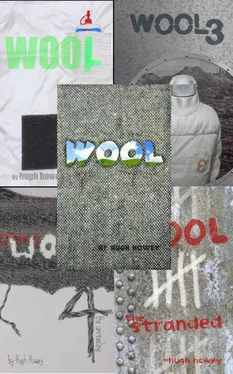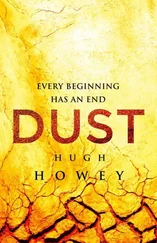WOOL OMNIBUS EDITION
The Collected Works of Wool 1–5
by Hugh Howey
This collected work is dedicated to anyone who dares dream of a better place.
The children were playing while Holston climbed to his death; he could hear them squealing as only happy children do. While they thundered about frantically above, Holston took his time, each step methodical and ponderous, as he wound his way around and around the spiral staircase, old boots ringing out on metal treads.
The treads, like his father’s boots, showed signs of wear. Paint clung to them in feeble chips, mostly in the corners and undersides, where they were safe. Traffic elsewhere on the staircase sent dust shivering off in small clouds. Holston could feel the vibrations in the railing, which was worn down to the gleaming metal. That always amazed him: how centuries of bare palms and shuffling feet could wear down solid steel. One molecule at a time, he supposed. Each life might wear away a single layer, even as the silo wore away that life.
Each step was slightly bowed from generations of traffic, the edge rounded down like a pouting lip. In the center, there was almost no trace of the small diamonds that once gave the treads their grip. Their absence could only be inferred by the pattern to either side, the small pyramidal bumps rising from the flat steel with their crisp edges and flecks of paint.
Holston lifted an old boot to an old step, pressed down, and did it again. He lost himself in what the untold years had done, the ablation of molecules and lives, layers and layers ground to fine dust. And he thought, not for the first time, that neither life nor staircase had been meant for such an existence. The tight confines of that long spiral, threading through the buried silo like a straw in a glass, had not been built for such abuse. Like much of their cylindrical home, it seemed to have been made for other purposes, for functions long since forgotten. What was now used as a thoroughfare for thousands of people, moving up and down in repetitious, daily cycles, seemed more apt in Holston’s view to be used only in emergencies and perhaps by dozens.
Another floor went by—a pie-shaped division of dormitories. As Holston ascended the last few levels, the last steps of his life, the sounds of childlike delight rained down even louder from above. This was the laughter of youth, of souls who had not yet come to grips with where they lived, who did not yet feel the press of the earth on all sides, who in their minds were not buried at all, but alive . Alive and unworn, dripping happy sounds down the stairwell, trills that were incongruous with Holston’s actions, his decision and determination to die.
As he neared the upper level, one young voice rang out above the others, and Holston remembered being a child in the silo—all the schooling and the games. Back then, the stuffy concrete cylinder had felt, with its floors and floors of apartments and workshops and hydroponic gardens and purification rooms with their tangles of pipes, like a vast universe, a wide expanse one could never fully explore, a labyrinth he and his friends could get lost in forever.
But those days were more than thirty years distant. Holston’s childhood now felt like something two or three lifetimes ago, something someone else had enjoyed. Not him. He had an entire lifetime as sheriff weighing heavy, blocking off that past. And more recently, there was this third stage of his life—a secret life beyond childhood and being sheriff. It was the last layers of himself ground to dust, three years spent silently waiting for what would never come, each day longer than any month from his happier lifetimes.
At the top of the spiral stairway, Holston’s hand ran out of railing. The curvy bar of worn steel ended as the stairwell emptied into the widest rooms of the entire silo complex: the cafeteria and the adjoining lounge. The playful squeals were level with him now. Darting bright shapes zagged between scattered chairs, playing chase. A handful of adults tried to contain the chaos. Holston saw Donna picking up scattered chalk and crayon from the stained tiles. Her husband Clarke sat behind a table arranged with cups of juice and bowls of cornflour cookies. He waved at Holston from across the room.
Holston didn’t think to wave back, didn’t have the energy or the desire. He looked past the adults and playing children to the blurry view beyond, projected on the cafeteria wall. It was the largest uninterrupted vista of their inhospitable world. It was a morning scene. Dawn’s dim light coated lifeless hills that had hardly changed since Holston was a boy. They sat, just as they always had, while he had gone from playing chase among the cafeteria tables to whatever empty thing he was now. And beyond the stately rolling crests of these hills, the top of a familiar and rotting skyline caught the morning rays in feeble glints. Ancient glass and steel stood distantly where people, it was suspected, had once lived aboveground.
A child, ejected from the group like a comet, bumped into Holston’s knees. He looked down and moved to touch the kid—Susan’s boy—but just like a comet, the child was gone again, pulled squealing back into the orbit of the others.
Holston thought suddenly of the lottery he and Allison had won the year of her death. He still had the ticket; he carried it everywhere. One of these kids—maybe he or she would be two by now and tottering after the older children—could’ve been theirs. They had dreamed, like all parents do, of the double fortune of twins. They had tried, of course. Night after glorious night of attempting to redeem that ticket, other parents wishing them luck, other lottery hopefuls silently praying for an empty year to pass.
He and Allison had invited superstition into their lives, looking to anything for help. Tricks like hanging garlic over the bed that supposedly increased fertility, two dimes under the mattress for twins, a pink ribbon in Allison’s hair, smudges of blue dye under Holston’s eyes—all of it ridiculous and desperate and fun. The only thing crazier would have been to not try everything, to leave some silly séance or tale untested.
But it wasn’t to be. Before their year was even out, the lottery had passed to another couple. It hadn’t been for a lack of trying; it had been a lack of time. A sudden lack of wife .
Holston turned away from the games and the blurry view and walked toward his office, situated between the cafeteria and the silo’s airlock. As he covered that ground, his thoughts went to the struggle that once took place there, a struggle of ghosts he’d had to walk through every day for the last three years. And he knew—if he turned and hunted that expansive view on the wall—if he squinted past the ever worsening blur of cloudy camera lenses and airborne grime, if he followed that dark crease up the hill, that wrinkle that worked its way over the muddy dune toward the city beyond, he could pick out her quiet form. There, on that hill, his wife could be seen. She lay like a sleeping boulder, the air and toxins wearing away at her, her arms curled under her head.
Maybe.
It was difficult to see, hard to make out clearly even back before the blurring had begun anew. And besides, there was little to trust in that sight. There was much, in fact, to doubt. So Holston simply chose not to look. He walked through that place of ghostly struggle where bad memories lay eternal, that scene of sudden madness, and entered his office.
“Well, look who’s up early,” Marnes said, smiling.
Holston’s deputy closed a metal drawer on the filing cabinet, a lifeless cry singing from its ancient joints. He picked up a steaming mug, then noted Holston’s solemn demeanor. “You feeling okay, boss?”
Читать дальше












